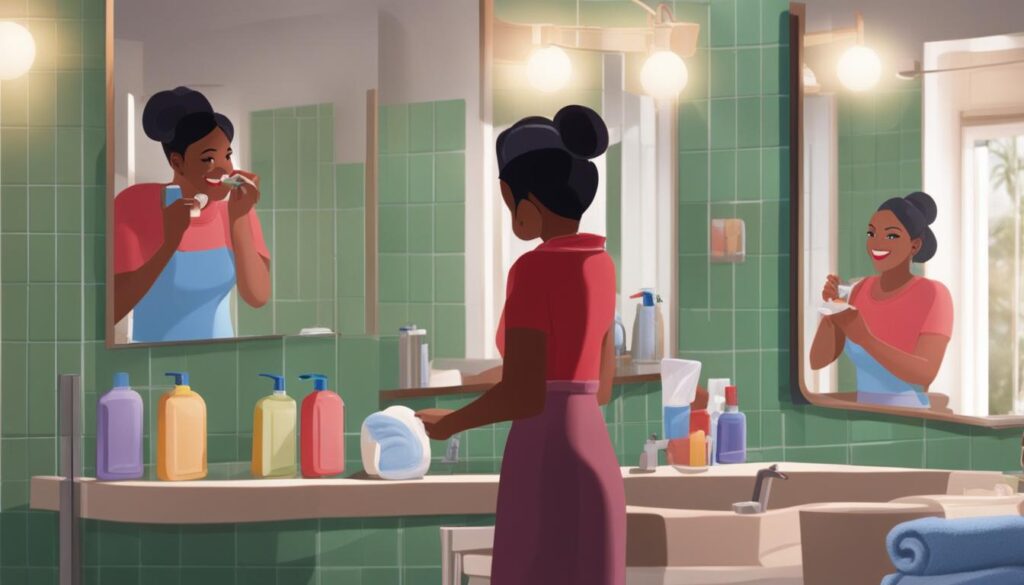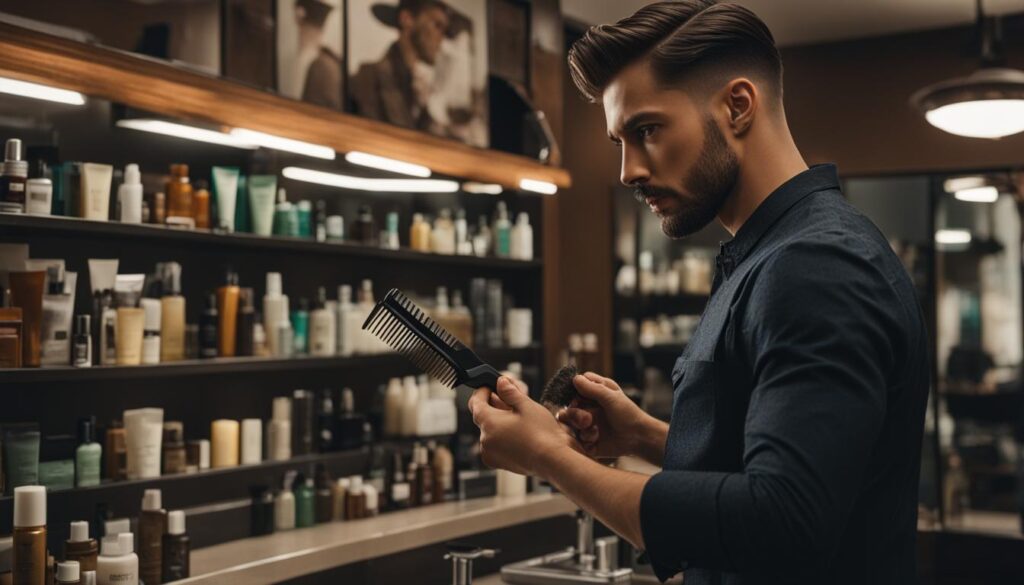We may earn money or products from the companies mentioned in this post.
Personal hygiene is an essential aspect of maintaining good health and well-being. A hygiene routine that suits your lifestyle can help you cultivate effective hygiene practices and prevent infections. In this section, we will provide you with top personal hygiene tips to help you master your daily routine and promote good health.
From hand washing to oral hygiene, incorporating good personal care routine habits into your daily routine can prevent the spread of germs and diseases. Here are some hygiene practices to help you maintain a clean and healthy lifestyle:
Key Takeaways:
- Personal hygiene is essential for overall well-being and health.
- Follow a hygiene routine that suits your needs to cultivate effective hygiene practices.
- Incorporate good hygiene practices like hand washing and oral hygiene into your daily routine.
Importance of Personal Hygiene
Personal hygiene habits are essential to maintain a healthy and disease-free body. Cleanliness is a crucial aspect of our lives, and we must follow proper health and hygiene tips to stay healthy and clean. Here are some cleanliness tips that can help you maintain personal hygiene:
- Wash your hands regularly with soap and water for at least 20 seconds, especially after using the restroom, coughing, sneezing, or blowing your nose.
- Take a shower daily and wash your hair regularly.
- Brush your teeth twice a day and floss daily to maintain oral hygiene.
- Trim your nails regularly to prevent dirt and germs from accumulating under them.
- Wear clean clothes, and wash them regularly.
Why Is Personal Hygiene Important?
Personal hygiene habits prevent the spread of germs and infections. If you maintain good hygiene practices, you are less likely to fall ill and contract contagious diseases. Besides, following personal hygiene tips can also improve your self-esteem, confidence, and overall well-being.
Cleanliness plays an essential role in disease prevention. Various infectious diseases, such as COVID-19, can be prevented by following proper hygiene practices, such as wearing a mask, washing hands regularly, and social distancing.
Health and Hygiene Tips
In addition to the cleanliness tips mentioned earlier, here are some health and hygiene tips to promote personal hygiene:
“Hygiene is two thirds of health.”
Indeed, personal hygiene is a crucial component of good health. Here are some health and hygiene tips to keep yourself healthy:
- Eat a balanced diet to provide your body with the required nutrients to stay healthy.
- Exercise regularly to keep your body in shape and maintain good mental health.
- Get enough sleep to allow your body to rest and rejuvenate.
- Manage stress levels through relaxation techniques such as yoga, meditation, or breathing exercises.
By incorporating these health and hygiene tips into your lifestyle, you can maintain good personal hygiene and achieve optimal health and well-being.
The Basics of Personal Hygiene
Developing a personal hygiene routine is essential for maintaining good health. In this section, we will cover the basics of personal hygiene and provide you with hygiene tips for both adults and kids.
Hygiene Tips for Adults
As an adult, it is crucial to establish a personal hygiene routine that suits your lifestyle. Here are some basic personal hygiene tips to incorporate into your routine:
- Wash your hands frequently, especially before eating and after using the restroom
- Take a shower or bath daily, using soap and water to clean your body
- Brush and floss your teeth at least twice a day to maintain good dental hygiene
- Wash your face twice a day to remove dirt and oil, preventing acne breakouts
- Wash your clothes and bedding regularly to maintain cleanliness
Following these hygiene tips can help prevent the spread of germs and infections, and promote overall well-being.
Hygiene Tips for Kids
Teaching kids good hygiene practices is essential for maintaining their health and well-being. Here are some hygiene tips for kids:
- Teach kids to wash their hands frequently, especially before eating and after using the restroom
- Incorporate daily bathing or showering into their routine
- Teach kids to brush and floss their teeth twice a day to maintain good dental hygiene
- Teach kids to cover their mouth and nose when coughing or sneezing
- Encourage kids to use their tissues only once and throw them away properly
By teaching kids these basic hygiene practices, you are setting them up for a lifetime of good habits and overall well-being.
Oral Hygiene Tips
Dental hygiene is a critical aspect of personal hygiene. By following a few simple oral hygiene tips, you can keep your teeth and gums healthy and prevent problems such as bad breath and tooth decay.
Brush Your Teeth Twice a Day
One of the best things you can do for your oral hygiene is to brush your teeth twice a day. Use a soft-bristled toothbrush and toothpaste with fluoride. Brush for at least two minutes and be sure to clean all surfaces of your teeth.
Floss Daily
Flossing is another essential part of dental hygiene. Floss at least once a day to remove food particles and plaque from between your teeth and along the gumline.
Use Mouthwash
Mouthwash is an excellent tool for maintaining dental hygiene. It can help freshen your breath and kill bacteria that cause plaque and gum disease. Choose a mouthwash with fluoride and antiseptic properties.
Visit the Dentist Regularly
Regular dental check-ups are crucial for maintaining good oral hygiene. Visit your dentist at least twice a year for cleanings and exams. Your dentist can identify and treat any problems early on, before they become more serious.
Consider Dental Products
There are many dental products available that can help improve your oral hygiene. Electric toothbrushes are a great option as they can clean your teeth more thoroughly than a manual brush. Water flossers are also an excellent tool for removing debris and bacteria from hard-to-reach areas.
By following these oral hygiene tips, you can maintain good dental hygiene and keep your teeth and gums healthy. Remember, a healthy mouth is an essential part of overall well-being.
Skin and Body Care
Taking care of your skin and body is essential for maintaining good personal hygiene. Establishing a proper skin care routine and following body hygiene tips can help keep your skin clean and healthy. Using the appropriate personal hygiene products can also contribute to overall well-being.
Skin Care Routine
A good skin care routine involves cleansing, exfoliating, moisturizing, and protecting your skin. It is important to use products that suit your skin type, whether it is oily, dry, or a combination. Here are some tips to develop a proper skin care routine:
- Cleansing: Use a gentle cleanser to remove dirt, oil, and makeup from your skin. Wash your face twice a day, in the morning and evening.
- Exfoliating: Exfoliate your skin once or twice a week to remove dead skin cells and promote cell regeneration.
- Moisturizing: Apply a moisturizer to your skin daily to keep it hydrated and prevent dryness.
- Protection: Use a sunscreen with at least SPF 30 to protect your skin from harmful UV rays.
Body Hygiene Tips
Personal hygiene also includes taking care of your body. Here are some body hygiene tips to follow:
- Shower or bathe every day to keep your skin clean.
- Use a gentle soap to avoid stripping your skin of natural oils.
- Wash your hair regularly to keep it clean and prevent dandruff and other scalp issues.
- Trim your nails regularly to prevent dirt and bacteria buildup.
- Wear clean clothes and undergarments every day.
Personal Hygiene Products
Using the appropriate personal hygiene products can help keep your skin and body clean and healthy. Here are some essential personal hygiene products to include in your hygiene routine:
| Product | Purpose |
|---|---|
| Soap | To cleanse skin and remove dirt and bacteria |
| Shampoo | To cleanse hair and remove dirt and oil buildup |
| Toothbrush and toothpaste | To clean teeth and prevent dental issues |
| Deodorant | To reduce body odor and perspiration |
| Sunscreen | To protect skin from harmful UV rays |
By following these skin and body care tips, you can maintain good personal hygiene and promote overall well-being.
Personal Hygiene During Illness
During times of illness, practicing good personal hygiene habits is crucial to prevent the spread of germs. Here are some hygiene tips to keep in mind when you are sick:
- Wash your hands frequently with soap and water for at least 20 seconds. If soap and water are not available, use an alcohol-based hand sanitizer.
- Cover your mouth and nose with a tissue when coughing or sneezing. If you don’t have a tissue, cough or sneeze into your elbow or upper sleeve, not your hands.
- Avoid touching your face, especially your eyes, nose, and mouth, as this can spread germs from your hands to your face.
- Stay home if you are feeling ill to avoid spreading illness to others.
- Dispose of used tissues in a lined trash can, and wash your hands afterward.
- Clean and disinfect frequently touched surfaces, such as doorknobs, light switches, and countertops.
Hygiene Practices When Sick
If you are sick, there are additional hygiene practices you should follow to prevent the spread of illness:
| Hygiene Practice | Why It’s Important |
|---|---|
| Wear a face mask | Wearing a face mask can help prevent the spread of illness to others. |
| Use disposable or washable dishes and utensils | Using disposable or washable dishes and utensils can prevent the spread of illness through shared utensils. |
| Use a separate bathroom, if possible | Using a separate bathroom can help prevent the spread of illness to others in the household. |
Hygiene Tips for Illness Prevention
Here are some additional hygiene tips to help prevent illness:
- Get vaccinated against common illnesses, such as the flu and pneumonia.
- Avoid close contact with people who are sick.
- Stay home if you are feeling ill.
- Practice good hygiene habits, such as handwashing and covering your mouth and nose when coughing or sneezing.
- Clean and disinfect frequently touched surfaces, such as doorknobs, light switches, and countertops.
By following these hygiene practices and tips, you can help prevent the spread of illness and stay healthy!
Conclusion
In conclusion, personal hygiene is an essential aspect of daily life that should not be overlooked. By following the top personal hygiene tips we have provided, you can maintain good hygiene practices, establish a hygiene routine that suits your needs, and promote overall well-being.
Remember to prioritize hand hygiene, respiratory hygiene, and to stay clean during times of illness. Developing a proper skin care routine, maintaining excellent oral hygiene, and using appropriate personal hygiene products for different body parts are also crucial for optimal personal hygiene.
By making personal hygiene a priority, you can help prevent the spread of diseases, maintain good health, and improve your overall quality of life. So don’t forget to master your daily routine with these top personal hygiene tips!
FAQ
What is personal hygiene?
Personal hygiene refers to the practices and routines that individuals undertake to maintain cleanliness and promote good health. It includes activities such as handwashing, bathing, brushing teeth, and wearing clean clothes.
Why is personal hygiene important?
Personal hygiene is essential for several reasons. It helps prevent the spread of germs and illnesses, promotes overall health and well-being, boosts self-confidence, and improves social interactions.
What are some basic personal hygiene practices?
Basic personal hygiene practices include regular handwashing, taking showers or baths, brushing teeth twice a day, using deodorant, wearing clean clothes, and maintaining a clean living environment.
How often should I brush my teeth?
It is recommended to brush your teeth at least twice a day, using fluoride toothpaste and a soft-bristle toothbrush. Brushing after meals and before bed is generally considered sufficient.
What should I include in my skincare routine?
A good skincare routine typically involves cleansing the face twice a day, moisturizing, applying sunscreen, and using suitable skincare products for specific concerns such as acne or aging.
How can I prevent the spread of germs when I’m sick?
When you’re sick, it’s vital to practice proper respiratory hygiene by covering your mouth and nose when coughing or sneezing with a tissue or your elbow. Regularly washing hands with soap and water for at least 20 seconds is also crucial in preventing the spread of germs.
Affiliate Disclosure: This post may contain affiliate links. If you purchase through our link, we may receive a small commission, but at no additional cost to you. For more information, please see our Disclosure statement.



